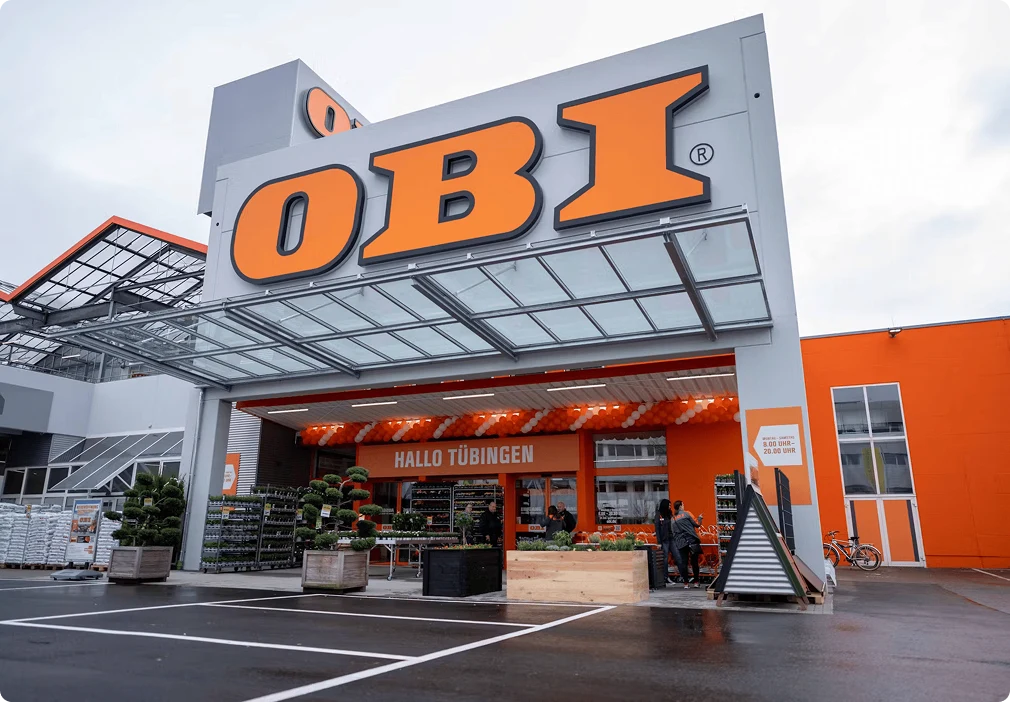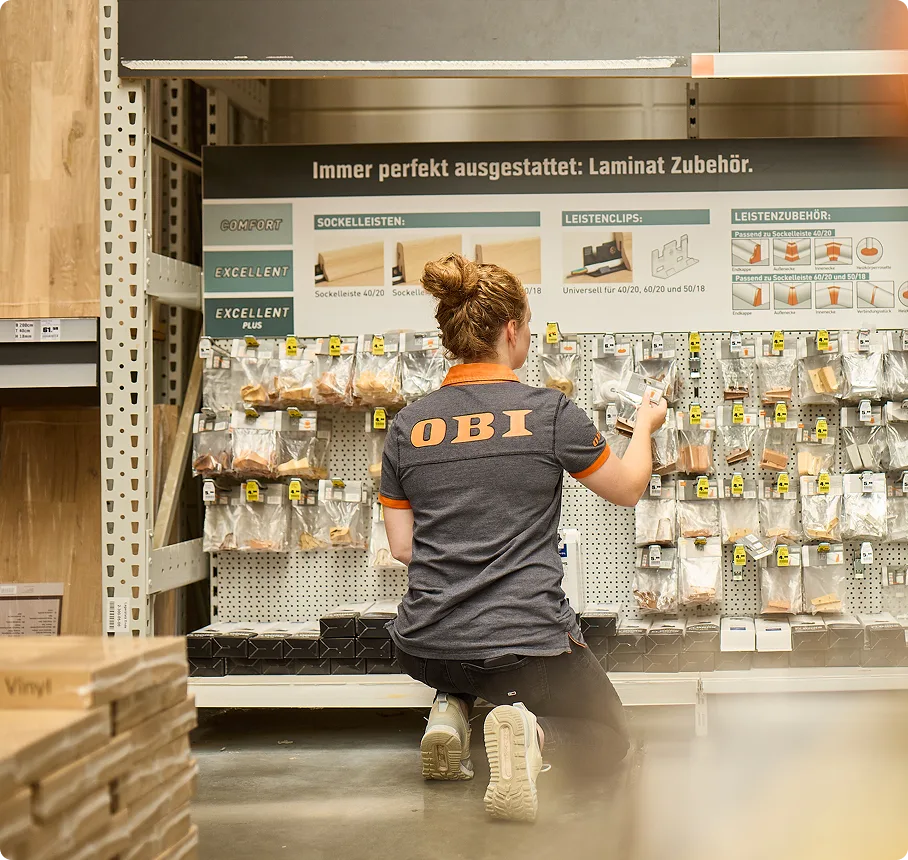SUCCESS STORY

For more than 50 years, OBI GmbH & Co. Deutschland KG (OBI) has been an iconic part of the international “Do it Yourself” (DIY) landscape, helping customers create a more beautiful home. As a friendly, family-oriented retailer, they support home improvement projects ranging from garden design and bathroom planning to repairs, tool selection, and year-round flowering plants. They operate in 644 locations (with 348 stores in Germany) and employ 40,000 people across 10 countries. The company generated €8.2 billion in revenue in 2024 (€4.2 billion from Germany) and enjoys 93% brand recognition in Germany.

OBI’s needs grew beyond the capabilities of its in-house built Product Information Management (PIM) solution. The existing solution increasingly reached its limits: manual processes caused inefficiencies, long processing times delayed time-to-market, inconsistent product data affected quality, and country-specific requirements made it difficult to ensure compliance with internal and external standards. The DIY retailer wanted a more comprehensive, automated, and flexible PIM to improve product data accuracy and reliably manage a growing catalog of product information data across multiple countries.
Their priorities for a new PIM included:
The review process included two stages. It began with a demo involving the future users of the system, giving them a chance to experience it firsthand. This was followed by a technical review to see how well the solution could be integrated into the existing infrastructure, how it performed overall, and whether it met the company’s long-term requirements for scalability and future readiness.
During the review, the team identified several key improvement areas to enhance their operations and adaptability. They focused on:
In today’s fast-paced market, having efficient and well-coordinated processes is essential to respond quickly to emerging trends and changes. At OBI, staying ahead in a competitive retail environment means ensuring that product data processes are perfectly timed and highly efficient.
From a process standpoint, certain product categories require specific steps completed at specific times. For example, if there’s a new trend in the market, such as acoustic panels, the OBI team wants to be able to react quickly. If they still needed to enhance product data before listing, posting of the new product would be delayed, and a competitor that already has optimized data will surpass them with SEO and campaigns for faster visibility.
This is where their internal processes sometimes lag—the team first has to enrich product data. Their goal is to be more market-driven, more reactive, and move faster to act as needed, when needed, because new trends emerge constantly.

To succeed across different countries, OBI focuses on clear, linguistically precise communication tailored to the local needs and expectations of its customers. They always use local languages across the 10 countries they do business in. There’s a strong emphasis on German, but it’s very diverse. In Switzerland, for example, they also offer product pages in French and Italian.
When it comes to product data, the DIY retailer makes sure the local language pages don’t appear as if there’s a central German administration behind them. Depending on the country, the setup is more centralized or more decentralized. But for product data — what customers use to make purchasing decisions — they ensure that it is linguistically accurate.

Another major challenge the OBI team needed to manage was the complexity of their product catalog.
Their customer-facing product data — the products they want to present — goes into the OBI product catalog. The catalog doesn’t distinguish between retail and partner products; it shows everything OBI can sell. Then there are differentiations in the distribution: some products are only available online, others only in stores and some assortments are specific to certain countries. They also have hybrid models for both physical and digital channels.
Managing this complexity requires a robust, flexible, and centralized solution that can handle diverse data sources, support different distribution models, and ensure consistency across all channels and countries.
One of the greatest potential areas for added value is their partner network. OBI has placed a new emphasis on their product partners, which is helping them to expand their assortment of products. It’s important to them to include partners in this product information strategy to define quality standards across different levels and transition them into the new system. These will be supported by workflows and automated processes, enabling them to benefit from the strengths of market solutions, especially in areas like AI and product data management.
By deepening collaboration with their product partners, OBI is not only expanding its assortment but also ensuring high-quality, localized product information. The new Syndigo PIM system plays a central role in this effort: it enables the definition and enforcement of quality standards across different levels and supports the seamless integration of partner data into the central system, where they take over maintenance and control.
This approach not only guarantees data accuracy but also maximizes growth potential for both brick-and-mortar stores and digital marketplaces. With this solution, OBI can quickly respond to market changes, improve customer experience, and free up resources for innovation and strategic growth.
Together with Syndigo and Advellence—an experienced implementation partner—OBI is building a future-proof, scalable, and flexible IT architecture. This forms a solid foundation for sustainable digital transformation and successful expansion both domestically and internationally.
Meeting compliance requirements is a priority, followed by product information completeness and accuracy for the customer to make informed decisions and product comparisons for high customer satisfaction. They want to leverage this trusted product information to use in their product data in campaigns.
As the regulatory landscape becomes more complex, many of these compliance requirements are absolutely necessary and product-data relevant. Having confidence that their data is compliant offers reassurance — and a competitive advantage.
At the same time, sustainability is a growing concern. More and more consumers actively seek out environmental and ethical product details. As a result, sustainability compliance is a rising priority for OBI. They need to be able to measure, structure and report sustainability-related data in a way that enables action and continuous improvement.
With Syndigo’s PIM as the foundation, OBI gains the ability to centralize and govern all product information, including sustainability data, across categories and markets. Syndigo’s platform supports transparency and traceability of sustainability attributes, helping OBI to align with evolving ESG requirements while building consumer trust through reliable, data-driven communication.
OBI’s journey will stretch over several years. They’re starting now with phase one, which is focused on laying the foundation for a unified product catalog that consolidates their different business models: retail, wholesale, and partnering. This includes creating integrated international views for their global catalog and rolling out supporting processes across their country locations.
Phase two will focus on optimizing the processes of their content managers and data managers by leveraging Syndigo PIM features. Their goals are increased efficiency, better data quality, improved compliance handling, and gaining more control and insight into their product assortment and data.
Additional phases are still being defined, but they’ll focus on continuous improvement, automation, and the kind of iterative, inspect-and-adapt cycles they need to build intelligent enrichment workflows. They’ll also look at how they want to handle onboarding in the future, as well as how they manage lifecycle and time-to-market data — important processes when working with hybrid models that span partnering, retail, and wholesale.
OBI plans to continue reviewing the best ways to manage their product information and explore opportunities to optimize master data management and syndication for a more unified approach to their data management. In the meantime, they remain focused on shaping the future of DIY retail while solidifying their position as Europe’s first port of call for home and garden products.